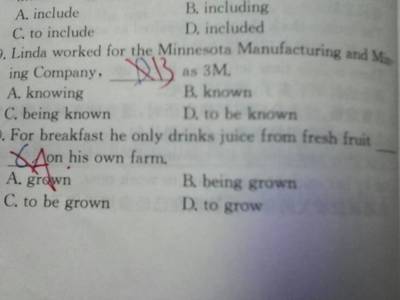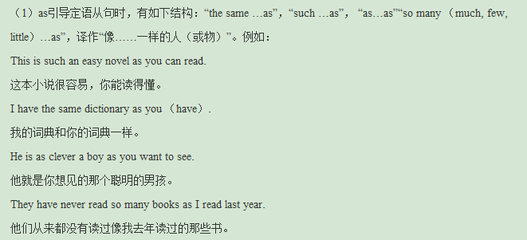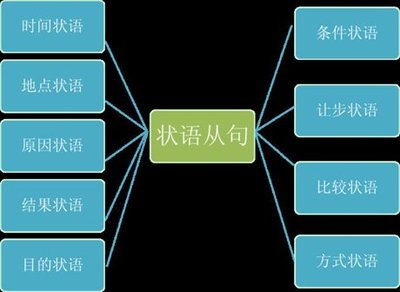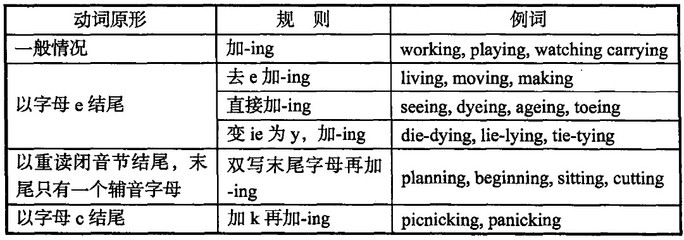让步状语从句是状语从句中的一种,其本身也是状语从句。引导让步状语从句的连词主要有以下这些:though,although,while,as;even if等。as引导的让步状语从句必须以部分倒装的形式出现,被倒装的部分可以是表语、状语或动词原形,though也可用于这样的结构中,但although不可以这样用。even if引导的让步从句含有强烈的假定性,可用来表示与事实相反的假设,但不能用来描述已经发生的事实。而even though引导让步状语从句时,是以从句的内容为先决条件的,即说话人肯定了从句的事实,表示已经发生了的事。
让步状语从句_让步状语从句 -连词
引导让步状语从句的连词主要有以下这些:though,although,while,as; even if,even though; whether...or...; no matter+疑问词,疑问词-ever,regardless of+名词/名词短语/名词从句,despite,in spite of。切记although,though 不可与but连用,但可以与yet连用。让步状语从句_让步状语从句 -用法
⑴though,although
语法学习表示“虽然,纵然”之意。这两个连词意思大致相同,在一般情况下可以互换使用。在口语中,though较常使用,although比though正式,二者都可与yet,still或never,the less连用,但不能与but连用。例如:Although/Though he was exhausted,(still) he kept on working. 虽然他已经精疲力竭了,但仍然继续工作。Although/Though he is very old,(yet) he is quite strong. 他虽然年纪大了,身体还很健壮。值得注意的是,although引导的让步状语从句位于主句之前的情况较多,though引导的让步状语从句可位于主句之前或主句之后。例如:She passed the examination though she had not studied very hard. 她虽然不用功学习,考试却及格了。
⑵as,though
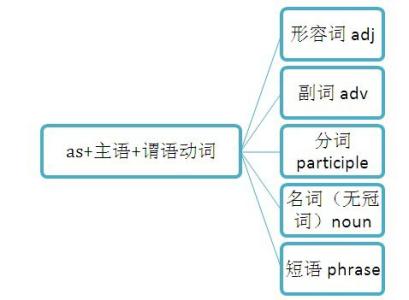
让步状语从句表示“虽然……但是”,“纵使……”之意。as引导的让步状语从句必须以部分倒装的形式出现,被倒装的部分可以是表语、状语或动词原形,though也可用于这样的结构中,但although不可以这样用。例如:Object as you may,I’ll go.(=Though/Although you may object,I’ll go.) 纵使你反对,我也要去。Hard as/ though he works,he makes little progress. (=Though he works hard,he makes little progress.)尽管他学习很努力,但几乎没取得什么进步。Child as/though he was,he knew what was the right thing to do.(=Though he was a child,he knew what was the right thing to do.)虽然他是一个孩子,但他知道该做什么。Fast as you read,you can’t finish the book so soon. 纵然你读得快,你也不能这么快读完这本书。LoveroftownsasIam,IrealizethatIoweadebttomyearlycountrylife.尽管我爱城市,但我知道,以往的乡村生活使我受益匪浅。Smallasatomeare,theyaremadeupofstillsmallerunits.尽管原子很小,但它们由更小的单位构成。由这一个复合连词引导的让步状语从句旨在说明正反两方面的可能性都不会影响主句的意向或结果,所以它的语气是比较强烈的,从而也更加坚定了主句的内容。例如:You'llhavetoattendtheceremonywhetheryou'refreeorbusy.不管你忙不忙,都要参加这个典礼。Whetheryoubelieveitornot,it'strue.无论你是否相信,这都是真的。Whetherornottheywinthisbattle,theywon'twinthewar.不管他们是否能赢得这次战役,他们绝不会赢得这场战争
⑶even if,even though
表示“即使……”,“纵使……”之意,含有一种假设。这两个复合连词的意思基本相同。它们常互换使用,但意义有细微差别。even if引导的让步从句含有强烈的假定性,可用来表示与事实相反的假设,但不能用来描述已经发生的事实。而even though引导让步状语从句时,是以从句的内容为先决条件的,即说话人肯定了从句的事实,表示已经发生了的事。例如:We’ll make a trip even if/though the weather is bad. 即使天气不好,我们也要作一次旅行。Even if he is poor,she loves him. (=He may be poor,yet she loves him.)即使他很穷,但她还是爱他。Even though he is poor,she loves him. (=He is poor,yet she loves him.)尽管他很穷,但她还是爱他。⑷whether...or...
表示“不论是否……”,“不管是……还是……”之意。evenif与eventhough的区别:1.evenif与eventhough的区别两者均可用于引导让步状语从句,其细微区别是:1.evenif引导的从句是往往是假设性的,相当于汉语的“即使”“纵然”“就算”“哪怕”。如:They’llstandbyyouevenifyoudon’tsucceed.即使你不成功,他们也会支持你。EvenifIhavetowalkallthewayI’llgetthere.即使我得一路走着去,我也要走到那里。Evenifitrainstomorrow,wewon’tchangeourplan.即使明天下雨,我们也决不改变计划。Formypart,Iplantogotothepartyevenifyoudecidenottogo.至于我,即使你决定不去参加晚会我也会去的。Evenifyousawhimpickupthemoney,youcan’tbesurehestoleit.就算你看见是他拾起的钱,你也不能肯定钱就是他偷的。正因为evenif从句的内容通常是假设性的,所以有时还可用于虚拟语气;这样用的evenif与单独使用的if比较接近。如:Evenifhehadthemoney,hewouldn’tbuyit.他即使有钱也不会买它。Iwouldhavemarriedherevenifshehadbeenpenniless.即使她身无分文,我也会和她结婚。2.eventhough引导的从句内容往往是真实的,主要用于引出不利用于主句情况的信息,相当于汉语的“尽管”“虽然”。如:Hewentouteventhoughitwasraining.尽管在下雨,他还是出去了。Eventhoughit’shardwork,Ienjoyit.虽然工作艰苦,我还是很喜欢。He’sthebestteachereventhoughhehastheleastexperience.他尽管经验最少,但教得最好。EventhoughIdidn’tknowanybodyattheparty,Ihadanicetime.尽管这次聚会上我谁也不认识,我也玩得挺痛快。这样用的eventhough与though或although的意思比较接近,许多时候可以互换(注意:英语可以说though和eventhough,但不能说evenalthough)。如:Eventhough[Thought,Although]Ifeltsorryforhim,lwassecretlypleasedthathewashavingdifficulties.虽然我为他感到惋惜,但对他的困难却暗自高兴。Eventhough[Thought,Although]wealltriedourbest,welostthegame.虽然我们已尽了最大的力量,但还是输了。3.不过,在实际语言运用中,evenif与eventhough有时也可不加区别地混用。如:Evenif[Eventhough]shelaughsathim,helikesher.尽管她嘲笑他,他还是很喜欢她。Wethoroughlyunderstandeachother,evenif[eventhough]wedon’talwaysagree.我们彼此非常了解,虽然有时候也有一些分歧。
⑸“no matter+疑问词”
或“疑问词-ever”的含义为“……都……;不管……都……”它们引导的让步状语从句可以互换。例如:No matter what happened,he would not mind. (=Whatever happened,he would not mind.) 无论发生了什么事情,他都不会介意的。No matter who you are,you must keep the law.(=Whoever you are,you must keep the law. 不管你是谁,你都需要遵纪守法。Whenanyonedoessomethingforyou,nomatterhowsamllandnomatterwhetherhe'sasuperiororservant,it'spropertosay“Thankyou”.只要任何人替你做了一件事,不管事情多么微不足道,也不管他是你的上司还是你的仆人,你都应该说声“谢谢”但“no matter+疑问词”结构只能引导让步状语从句,而“疑问词-ever”还可以引导名词性从句。例如:Whatever (=No matter what) you say,I won’t believe you. (Whatever 引导让步状语句) 无论你说什么,我都不会相信你。I'll eat whatever (≠no matter what) you give me. (whatever引导宾语从句)你给我吃什么,我就吃什么。Whoever comes will be welcome. (Whoever 引导主语从句) 不管谁来都受到欢迎。此外,有时while也可以引导让步状语从句,但一般要位于句首。例如:While I like the colour,I don't like the shape.我虽然喜欢那颜色,但不喜欢那形状。综上所述,学习让步状语从句的关键是关联词的选用;其次,要注意的是由as引导的让步状语从句要用倒装语序。让步状语从句表示:虽然,尽管,即使等概念,由although,though(尽管,即使),however(无论怎样),whatever(无论什么),whoever(无论谁),whomever(无论谁),whichever(无论哪个),whenever(无论何时),wherever(无论哪里),whether(是否),no matter (who,what,where,when,etc) (无论……),even if(即使),even though(即使)等词引导。如:We won’t be discouraged even if(=even though) we fail ten times.我们就是失败十次也不泄气。It was an exciting game,though / although no goals were scored.那是一场精彩的球赛,尽管一个球都没进。(though,although不能与 but连用)Whether you believe it or not,it’s true.不管你信不信,这是真的。However (=No matter how) expensive it may be,I’ll take it.无论它有多贵,我也要买下它。Don’t let them in,whoever(=no matter who) they are.不管他们是谁,别让他们进来。No matter what I say or how I say it,he always thinks I’m wrong.无论我说什么或怎么说,他总认为是我错。让步状语从句_让步状语从句 -特别提醒
让步状语从句1. no matterwhat(who,which,when,etc.)与whatever(whoever,whichever,whenever,etc.)的区别:当引导让步状语从句时,两者相同,可以互换,但当引导名词性从句(主语从句,宾语从句,表语从句和同位语从句)时则只能用whatever(whoever,whichever,whenever,etc)。如上面最后两个例句可改为:However pure the water looks,I do not want to drink it.I want to marry the man I love,no matter who he may be.下面句子不能用no matter结构(no matter不能引导名词性从句):Whoever comes back first is supposed to win the prize.(主语从句)I am ready to do whatever you want me to .(宾语从句)例证:Whatever you did,I will accept.为让步状语从句.I will accept whatever you did.为宾语从句.2. as 引导让步状语从句的用法引导让步状语从句时,as意为“虽然,尽管”,通常从句要倒装,倒装的方法是将从句的表语或状语放在as之前,而用though引导让步状语从句时句字则不必倒装(口语中也可倒装)。e.g. Heavily as it was raining outside,they started out very early.Young as he is,he knows a lot=Though he is young 或Young though he is,he….他虽然年轻,但懂得很多。(though 也有这种用法,可以替换as,但although没有这种用法)注意,名词提句首时,不加冠词:e.g:teacher as he is,he likes Chinese very much(teacher 前不加a或the)。though还可以用作副词,放在句末。如:It was hard work;; I enjoyed it,though=It was hard work,but I enjoyed it.那工作很苦,但是我喜欢干。3.用though/although,as 引导让步状语从句时,句中不能用but表示转折语气。不能说:Though he looks weak,but he is healthy.而要说:Though he looks weak,he is healthy.或者说:He looks weak,but he is healthy.我自己认为让步就是存在一定条件下的说法.4 . however 用作副词,不可连接句子。但可置于第二句的句首、句末或句中。要特别注意标点的使用。eg: Alice is a good student.However,she has one shortcoming.爱丽丝是一个很好的学生,但她仍有缺点。He has not arrived. He may,however,come later. The composition is all right. There is room for improvement,however.⒌ 除以上提到的从句连词外表示让步的介词短语有despite,in spite of,后接名词。eg. Despite all these facts,we cannot ignore the advantages of learning through internet.though和although引导让步状语从句时,不可以与but连用。汉语中用"虽然……但是……”,但英语中只用though,although或but即可。although/though he is very old,he still works very hard.=(he is very old,he still works very hard)虽然他老了,但他仍然很努力地工作。不可说:although/though he is very old,but he still works very hard。though和although可以与yet连用。此处yet虽与but同义,但它不是连词,而是副词。though l knew the fact,yet l didnt say anything。尽管我知道,但我什么都没说。
让步状语从句_让步状语从句 -实例分析
句子一:WithregardtoFuturistpoetry,however,thecaseisratherdifficult,forwhateverFuturistpoetrymaybe--evenadmittingthatthetheoryonwhichitisbasedmayberight--itcanhardlybeclassedasLiterature.thecaseisratherdifficult是句子主干,rather是副词,相当地,修饰形容词difficult;withregardtoFuturistpoetry作状语,withregardto就...而言;however表明前后对比关系;
for引导原因状语从句,解释难的原因,从句为itcanhardlybeclassedasLiterature,hardly是否定副词,几乎不;在原因状语从句中,whateverFuturistpoetrymaybe--evenadmittingthatthetheoryonwhichitisbasedmayberight是让步状语从句,evenadmittingthatthetheoryonwhichitisbasedmayberight在句中充当状语,admittingthat后接宾语从句thetheorymayberight,onwhichitisbased是修饰thetheory的定语从句。
参考翻译:然而就未来主义诗歌而言,情况就很难说了,因为不管未来主义诗歌是什么--即使承认其理论基础是正确的--也很难将其归为文学。
句子二:Declaringthathewasopposedtousingthisunusualanimalhusbandrytechniquetoclonehumans,heorderedthatfederalfundsnotbeusedforsuchanexperiment-althoughnoonehadproposedtodoso-andaskedanindependentpanelofexpertschairedbyPrincetonPresidentHaroldShapirotoreportbacktotheWhiteHousein90dayswithrecommendationsforanationalpolicyonhumancloning.
句子主干是heorderedthat...andasked...to...;Declaringthat...现在分词作状语,that后接宾语从句;heorderedthat后接宾语从句,order后跟虚拟语气,省略了should;连字符中间的句子作插入语,是although引导的让步状语从句;asked是与ordered并列的谓语动词,用法是asksb.(experts)todo(reportback),chairedbyPrincetonPresidentHaroldShapiro过去分词做定语修饰experts,totheWhiteHousein90dayswithrecommendationsforanationalpolicyonhumancloning做状语。
参考翻译:他宣布自己反对使用这种非同寻常的畜牧技术来克隆人类,并下令不准使用联邦基金做此类实验--尽管也没有人建议这么做--他还请一个以普林斯顿大学校长哈罗德.夏皮罗为主席的独立专家组在90天内向白宫汇报关于制定有关克隆人的国家政策的建议。
分析每一个考研英语中的长难句,首先要找出其中的句子主干是关键,就像一棵大树的主干,再看其他分支具体是做什么成分,在分析具体成分时需要对于这些状语、定语、补语有所了解,真题也是对这些知识的理解与巩固。
 爱华网
爱华网